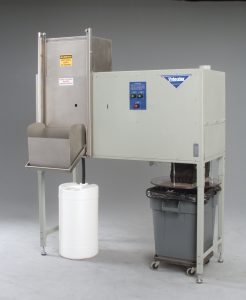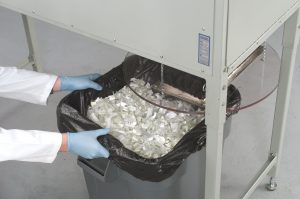JWC Environmental helps S&G find an appropriate grinding solution for their medical waste disposal machine.
by Kevin Bates
In 1994, Mark Griffith was flipping through a trade magazine while mulling over what kind of grinder to install in his vial-destroying machine, the Vyleater. That’s when he found JWC Environmental and decided to give them a call. The rest, as they say, is history.
An Environmental Machine
Griffith, a second-generation owner of S&G Enterprises, says his company seeks to provide environmental solutions, “While we sell industrial equipment, our focus is specifically machines customers can use to reduce or minimize their volume of waste—whatever type of waste that may be.”
The objective of S&G’s Vyleater is to separate a liquid from its container so both can be disposed of or recycled. The company identified a new market for the machine in cytology laboratory waste disposal in the late 1990s as its original markets, including environmental testing labs, pharmaceutical labs and the research and design labs at a petrochemical company, began to subside.
The timing of the Vyleater’s entrance to the cytology laboratory waste disposal market was impeccable. In the early 2000s, a new method for performing Pap smear tests was approved by the FDA. The test relies on an alcohol-based preservative to suspend cervical cells before they are syphoned off and automatically applied to a slide for reading purposes—leaving the alcohol in the vial. It’s become the most common method of cytology testing, which means labs generate anywhere from 500 to 3,000 small glass vials of leftover liquid per day. “It’s a chemical waste,” explained Griffith. “While there’s a little bit of human tissue in there, it’s really nothing but cells preserved in a fluid. The lab holds onto it for three or four weeks, but then they have to dispose of it.”
As labs transitioned to this form of cytology testing, they began to search for a mechanical method to open the containers and remove the liquid for disposal. If the fluid could be separated from the vial, then it could be disposed of as a regular chemical waste instead of biological waste, which is more expensive, and the leftover plastic could be recycled. Lucky for the laboratories, the Vyleater was the perfect machine for the job.
S&G sold their first Vyleater unit to a well-known East Coast university to handle vials of liquid generated from their research. And in that original Vyleater sat a JWC Environmental 3-SHRED-H Industrial Grinder.
JWC and the Vyleater
When Griffith contacted JWC in 1994, he had some specific requirements. “We had looked at a number of shredder and grinder type suppliers, but most of them made stuff that was way too big for our machines,” said Griffith. “We got some positive feedback from JWC, and while they had done very little OEM sales at that point, we decided to reach out to them.”
JWC Environmental (Santa Ana, CA) is a leading manufacturer of equipment for wastewater treatment, solids reduction, solids removal and processing. The Monster family of products—including the Muffin Monster and Channel Monster sewage grinders, Auger Monster fine screen, Screenings Washer Monster and Monster Separation System—is legendary for quality and reliability.
JWC was open to helping S&G find an appropriate grinding solution for their machines. “We talked with JWC about our objectives for the machine, and they ended up specifying a piece of equipment that might fit,” said Griffith. “I remember sending samples to their shop, and they did some grinding tests for us. We came up with a cutter profile that seemed to work best for the vials we were processing at the time.” The grinder that eventually made its way into the Vyleater was a Muffin Monster 3-series with 7-tooth cam cutters, optimized for S&G’s grinding requirements.
In recent years, the market for the Vyleater has expanded from mostly cytology test vials to urinalysis specimens. S&G sells the machine to drug screening labs, which test urine samples from commercial companies and rehabilitation facilities. According to Griffith, a good-sized lab can process anywhere from 2,000 to 5,000 specimens a day, which all need to be disposed of properly. “Manually opening up the specimens is a job no one wants,” he said.
Using the Vyleater to mechanically process the urinalysis samples would require some changes, specifically modifications to accommodate grinding the plastic containers, and counter the enhanced risk of corrosion. “So, we went back to JWC and said, ‘we need to do something that will hold up to these new challenges, and using stainless steel will be too pricey,’” said Griffith. JWC came back with a more aggressive grinding option to tackle the plastic vials, and devised a solution to Griffith’s cost concerns: the housing of the grinders is nickel-plated, while the cutters are all stainless steel so they won’t rust.
The end result? The Vyleater effortlessly chews up the bottles with the JWC grinder, separates the fluid out, which flows directly into a drain, and the plastic is washed and exits the machine to be disposed of or recycled.
Continuing Service
The majority of the Vyleater machines S&G sold in the early 2000s, are starting to show signs of wear from pulverizing and separating thousands of liquid filled vials on a daily basis for more than 15 years. And when it’s the grinder that starts to wear, JWC is quick to implement their streamlined service policy.
When a customer notifies JWC of a Vyleater with a grinder requiring maintenance, JWC builds a new grinder to the customer’s specifications and ships it directly to them. That means the customer can continue to use their unit while the new grinder is created, and swap it out when the new 3-SHRED-H arrives. The Vyleater remains operational throughout the process, and the customer can budget and plan the grinder swap around their schedule. “It really minimizes the amount of downtime my customer’s experience,” said Griffith. “I really like that.”
Griffith also likes that he made that first call to JWC in 1994. “I know when I call, they’ll know who I am,” he said. “I never have to reintroduce or explain myself. I can talk to somebody right away and get the support I need.”
Kevin Bates is the global director of marketing & product management for JWC Environmental. Kevin can be reached at [email protected].


